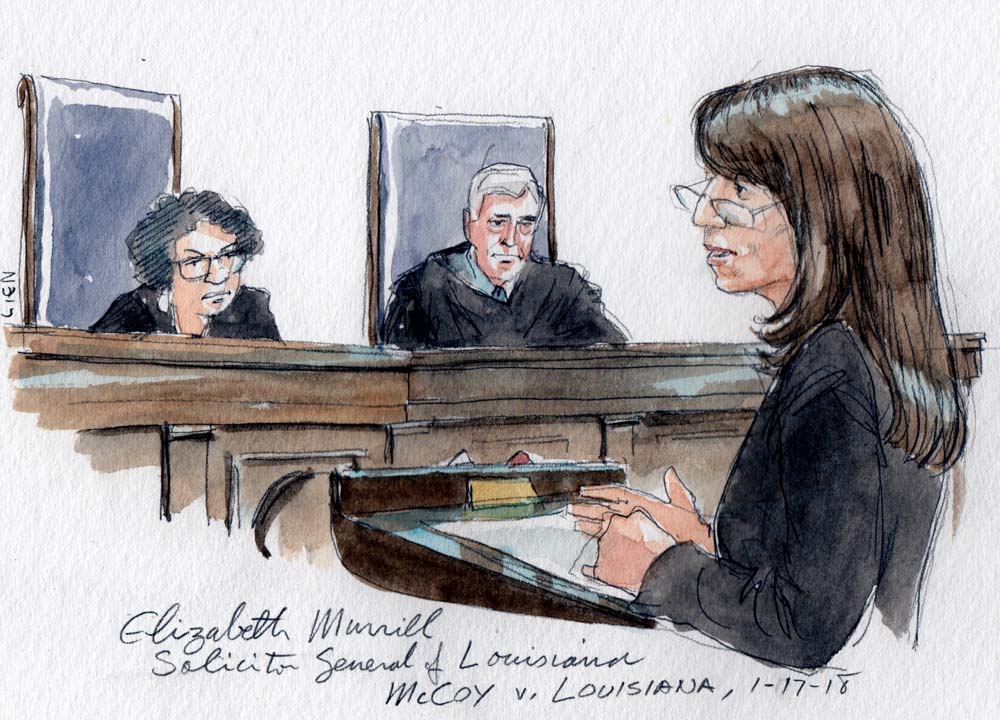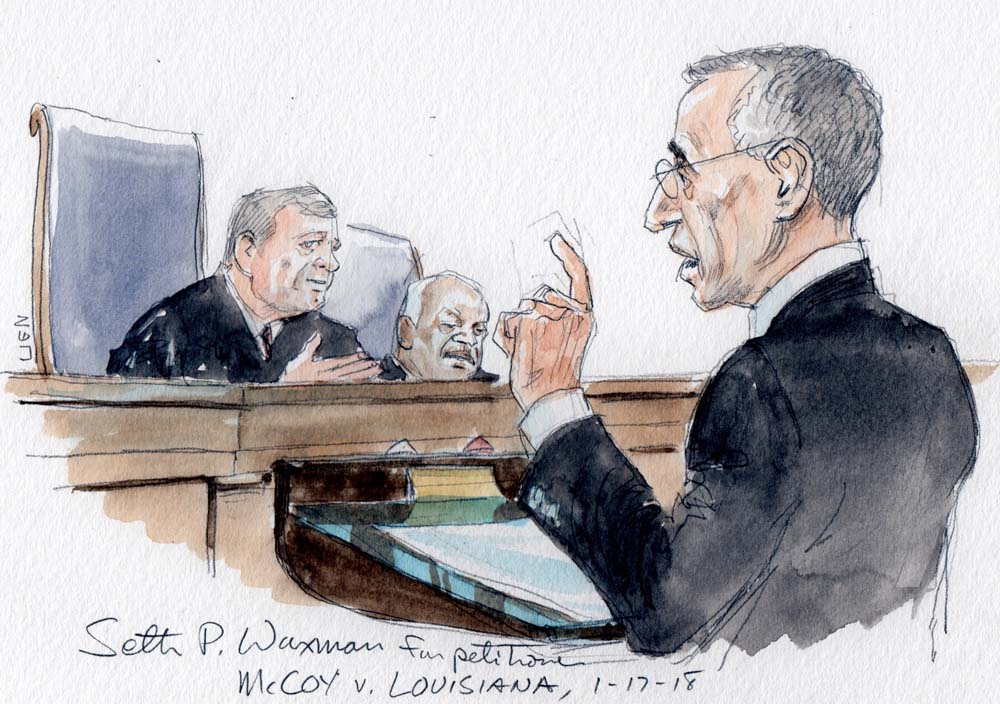Argument analysis: Concern for death-row inmate’s rights likely to trump line-drawing worries


The Supreme Court heard oral argument today in the case of Robert McCoy, a Louisiana death-row inmate who says that he should get a new trial because his own lawyer told jurors that he was guilty – over McCoy’s express objection. After just over an hour of spirited debate, the justices seemed sympathetic to McCoy’s plight, even if they were less certain about the legal principle on which they might rely to rule in his favor.
The case before the court today dates back to 2011, when McCoy was tried on three counts of first-degree murder for the shooting deaths of his estranged wife’s mother, stepfather and son. McCoy maintained that he was not in the state when the murders occurred, and that he was being framed by local police. But his attorney, Larry English, believed that the evidence against McCoy was “overwhelming,” and that his best chance to save McCoy’s life was to concede McCoy’s guilt and try to convince the jurors that McCoy hadn’t intended to kill anyone. English’s strategy backfired: McCoy was convicted and sentenced to death.
Arguing for McCoy today, former U.S. solicitor general Seth Waxman emphasized that the Constitution “guarantees a personal defense that belongs to the accused, and whether to admit or contest guilt is the paradigmatic example of that personal defense, not only because it singularly affects the life and liberty of the accused, but also because making that decision requires weighing subjective aspirations and value judgments that are unique to every individual.” Waxman spent much of his time at the lectern, however, addressing an issue first raised by Chief Justice John Roberts: How widely would his proposed rule apply? Or, put another way, how should courts figure out what kinds of decisions and strategies are sufficiently important to warrant a new trial if a lawyer disregards his client’s wishes?

Waxman tried to limit the potential reach of his rule, telling Roberts that a criminal defense lawyer “may not stand up and affirmatively vouch, admit that his client is guilty.”
Roberts was not mollified, asking Waxman whether a defense lawyer could make a smaller concession, such as whether a defendant had crossed state lines. Justice Samuel Alito also seemed troubled by the prospect that a defense lawyer “cannot concede any element of the offense.”
Then Justice Neil Gorsuch joined the fray, suggesting that specific pieces of evidence could also sometimes be “far more important than an element of the offense.” If so, he asked, why wouldn’t an inmate be entitled to a new trial if a defendant wanted to keep the evidence from being revealed to the jury but his lawyer didn’t see a good reason to object to its admission?
Waxman pushed back sharply, trying to return the court to the bigger picture. He told Gorsuch that he has been representing death-row inmates for 40 years. What those inmates care about, Waxman declared, “and what they have an autonomy, dignitary right to have protected is” their decision to assert their innocence.
Justice Stephen Breyer was more broadly troubled. He voiced what he described as a “very practical concern” – the idea that many criminal defendants “are just not really capable of managing their own defense.” But when defendants like McCoy have attorneys, he continued, “a constitutional rule that’s going to tell the lawyer how to argue his case” will mean that “lawyers will have a hard time defending this person. And you’re walking right into jail when you start telling your lawyer how to run this case.”
Justice Sonia Sotomayor seemed to regard such an outcome as unfortunate but inevitable. “People can walk themselves into jail,” she said. “They can walk themselves, regrettably, into the gas chamber. But they have a right to tell their story.”
Perhaps keeping the justices’ questions for Waxman in mind, Louisiana solicitor general Elizabeth Murrill offered a narrow rule that would allow the state to prevail in this case without requiring the justices to establish a rule to govern other, more difficult scenarios. At least in some death-penalty cases, she told the justices, an attorney “sometimes might be required to override his client on a trial strategy when the strategy that the client wants him to pursue is a futile charade and requires him to defeat both their objectives of defeating the death penalty.”

But Murrill quickly ran into a barrage of questions from the court. Sotomayor asked why the state’s proposed rule would only apply to the death penalty.
Justice Elena Kagan was also skeptical. The Supreme Court, she said, has “given lawyers a lot of leeway to make quite a number of decisions” during their defense. But in a case like this one, in which the defendant says he has an “overriding objective” of not admitting that he killed his family members, she queried, why can an attorney “say it doesn’t matter.”
Murrill countered that the lawyer’s “ultimate objective is to try to do the right thing for his client, to defeat the death penalty and save his life.”
Kagan was still unconvinced. She acknowledged that English was in a “terrible position.” But defeating the death penalty wasn’t McCoy’s top concern, she pointed out.
Gorsuch also seemed to side with McCoy. He asked Murrill why English’s actions weren’t a “structural error” – an error that is so fundamental that his conviction should automatically be reversed.
With the state facing opposition, Alito expressed frustration that McCoy’s case had even gotten to this point. McCoy may not have been competent to stand trial, he observed, and the judge denied a request to allow English to withdraw from representing McCoy.
In the end, although the justices were clearly concerned about how to draw a line between the kinds of scenarios that would require reversal when a lawyer disregards his client’s wishes and those that would not, those concerns generally appear to have been outweighed by a desire to allow a defendant in McCoy’s position to make his own decisions, however unwise.
A decision is expected by late June.
This post was originally published at Howe on the Court.
Posted in Merits Cases
Cases: McCoy v. Louisiana
